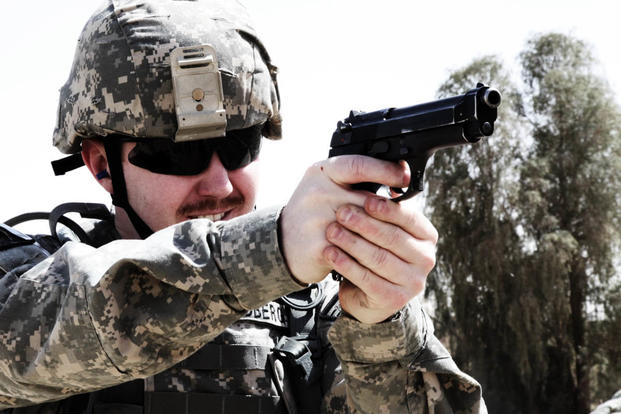The U.S. Army's chief of staff said Thursday that if he had his way, he'd abandon the bureaucratic Modular Handgun System effort and personally select the service's next pistol.
Speaking at the Future of War Conference 2016, Gen. Mark Milley said he has asked Congress to grant service chiefs the authority to bypass the Pentagon's multi-layered and complex acquisition process on programs that do not require research and development.
"We are not exactly redesigning how to go to the moon, right?" Milley said. "This is a pistol. ... And arguably, it is the least lethal and important weapon system in the Department of Defense inventory."
The Army launched its long-awaited XM17 MHS competition in late August to replace its Cold War era M9 9mm pistol. One of the major goals of the MHS effort is to adopt a pistol chambered for a more potent round than the current 9mm. The U.S. military replaced the .45 caliber 1911 pistol with the M9 in 1985 and began using the 9mm NATO round at that time.
Gunmakers had until Feb. 12 to submit proposals to the Army.
Milley used the program as an example of the bureaucratic acquisition system that often makes it overly complicated to field equipment to soldiers in a timely manner.
"We are trying to figure out a way to speed up the acquisition system," Milley said. "Some of these systems take multiple years, some of them decades to develop."
As the service chief, Milley said he should be able to say "here is your purpose; here is the end-state I want to achieve ... if you succeed, you are promoted and I give you a medal. If you fail, you are fired. You hold people accountable.
"I'm saying let me and then hold me accountable," he added. "Let me figure out what type of pistol we need and let me go buy it without having to go through nine years of incredibly scrutiny."
The program has a "367-page requirement document. Why?" Milley asked. "Well, a lawyer says this and a lawyer says that and you have to go through this process and that process and you have to have oversight from this that and the other."
Milley also criticized the lengthy testing process for MHS that's slated to cost $17 million.
"The testing -- I got a briefing the other day -- the testing for this pistol is two years," Milley said. "Two years to test technology that we know exists. You give me $17 million on the credit card, I'll call Cabelas tonight, and I'll outfit every soldier, sailor, airman, and Marine with a pistol and I'll get a discount on it for bulk buys."
That calculation appears off, though, since the handguns under consideration retail between $400 and $700 apiece and the military may purchase nearly a half million firearms as part of the program.
Current plans call for the Army to purchase more than 280,000 full-size handguns and 7,000 compact versions, officials maintain. The other military services participating in the MHS program may order an additional 212,000 systems above the Army quantity.
MHS is set to cost at least $350 million and potentially millions more if it results in the selection of a more potent pistol caliber, sources said.
The request for proposal calls on gun makers to submit packages that include full-size and compact versions of their handgun as well as hundreds of thousands of rounds for testing.
In a break from tradition, the Army is also requiring competing firms to prove that they are capable of delivering millions of rounds of pistol ammunition per month in addition to delivering thousands of new handguns per month, according to the request.
The competition will also evaluate expanding or fragmenting ammunition, such as hollow-point bullets, that have been used by law enforcement agencies for years. The Army's draft solicitation cited a new Defense Department policy that allows for the use of "special purpose ammunition."
"We are not figuring out the next lunar landing," Milley said. "This is a pistol.
"There is a certain degree of common sense to this stuff and that is what I am talking about. ... Empower the service chiefs with the capability to go out and do certain things. Speed the process up."
-- Matthew Cox can be reached at matthew.cox@military.com.



























